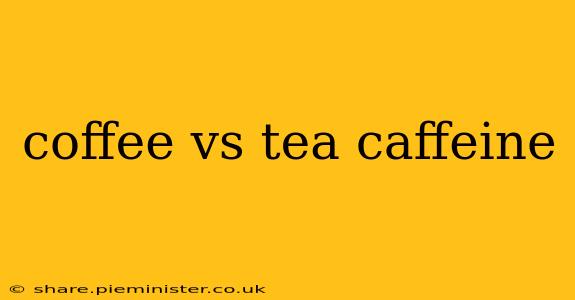The age-old debate: coffee versus tea. For many, the morning ritual revolves around one or the other, but the choice often comes down to personal preference and desired caffeine kick. While both beverages offer a stimulating boost thanks to caffeine, there are significant differences in their caffeine content, overall effects, and even the way they are consumed. This comprehensive guide dives deep into the caffeine content comparison between coffee and tea, exploring the nuances that make each a unique choice for caffeine lovers.
How Much Caffeine is in Coffee vs. Tea?
This is the most frequently asked question, and the answer isn't a simple number. The caffeine content of both coffee and tea varies dramatically depending on several factors. Let's break them down:
Coffee:
- Bean type: Arabica beans generally contain less caffeine than Robusta beans.
- Roast level: Darker roasts tend to have slightly less caffeine than lighter roasts, though the difference is often minimal.
- Brewing method: Stronger brews, like espresso, naturally contain more caffeine than drip coffee or cold brew.
- Serving size: An 8-ounce cup of coffee will have significantly less caffeine than a 16-ounce cup.
Tea:
- Tea type: Black tea typically contains more caffeine than green tea, white tea, or oolong tea.
- Steep time: Longer steep times generally extract more caffeine.
- Leaf type: The quality and type of tea leaf influence caffeine concentration. Larger leaves may yield a more intense brew.
- Serving size: As with coffee, a larger serving will naturally contain more caffeine.
Generally, a standard 8-ounce cup of brewed coffee contains between 80-100mg of caffeine, while an 8-ounce cup of brewed black tea contains approximately 30-50mg of caffeine. However, these are just averages, and variations are significant.
Which Has More Caffeine, Coffee or Tea?
Generally, coffee contains significantly more caffeine than tea. However, the difference can be less pronounced depending on the specific type of tea and coffee, brewing methods, and serving size. A strong cup of black tea might approach the caffeine levels of a weak cup of coffee, but the overall range for coffee is typically higher.
Is Tea Better for You Than Coffee?
This is a complex question with no definitive answer. Both coffee and tea offer potential health benefits, including antioxidants, which are beneficial for overall well-being. However, their impact on health varies depending on individual factors and the specific beverage's composition. Moderate consumption of both is generally considered safe and may offer certain health advantages. Consult your doctor for personalized advice.
Does Caffeine from Tea Affect You Differently Than Caffeine from Coffee?
While both coffee and tea contain caffeine, there's evidence suggesting that the experience of caffeine from tea might be different. This is partly due to the presence of other compounds in tea, like L-theanine, which can impact the body's response to caffeine. L-theanine is known to promote relaxation and focus, potentially counteracting some of the jittery effects associated with higher caffeine levels. This means that the caffeine from tea might offer a smoother, more sustained energy boost compared to coffee's often more immediate and intense effect. This is subjective, however, and varies from person to person.
How Can I Reduce Caffeine Intake from Coffee and Tea?
If you're looking to reduce your caffeine intake, there are several strategies:
- Switch to decaf: Both decaf coffee and decaf tea are widely available and offer a similar taste experience with significantly less caffeine.
- Reduce serving size: Smaller cups of coffee or shorter brewing times for tea will result in lower caffeine consumption.
- Choose lower-caffeine options: Opt for Arabica coffee beans or green/white tea for a less intense caffeine hit.
- Dilute your beverage: Adding water or milk can reduce the caffeine concentration.
- Spread out your intake: Instead of one large caffeine-rich drink, opt for several smaller portions throughout the day.
Ultimately, the best choice between coffee and tea depends on your personal preferences, desired level of caffeine, and individual sensitivities. By understanding the factors influencing caffeine content and the potential effects of each beverage, you can make an informed decision to suit your lifestyle and needs.
